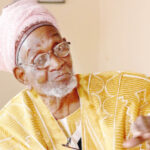At the time of his death in 1981, at the age of 70, the statesman and pioneering writer in Hausa Language, Abubakar Imam, had almost completed writing his life story. The uncompleted manuscript told the eventful life story of Abubakar Imam from his birth in 1911 in rural Kagara, in Kontagora province, in the present Niger State. He was educated largely at the hands of Bello Kagara his elder brother and mentor. Bello Kagara himself was one of the earliest to be handpicked by the colonialists in the North to be educated. He would eventually be one of the only two Nigerian teachers in the now-iconic Katsina Teachers College which opened in 1921. Abubakar Imam joined his brother in Katsina in 1922, where he attended primary school.
He was a bright student and in due course was qualified for Katsina Teachers College, the only one of its type in the North then. At the Katsina Teachers College Abubakar Imam was a contemporary of many of the Northern students who would later emerge as our leaders. He was a year behind Ahmadu Bello, later Premier Northern Region and also a year ahead of Abubakar Tafawa Balewa, Nigeria’s first Prime Minister. Some of his classmates included Isa Koto a pioneer Federal Permanent Secretary, Isa Kaita, Wazirin Katsina, Northern Minister of Education and Bello Dandago, Sarkin Dawaki Maituta, a Chief whip of the Federal House of Representative in the First Republic.
- Woman, 2 children die in Ogun road crash
- Free train rides: NRC debunks ticket sales, records passengers’ surge
After graduation from the college, Imam settled in Katsina as a teacher in the Middle School. That was where his writing talents were discovered. He was particularly noted when he took part in a literary competition organised by the Education Department of Northern Region in 1933 and his book Ruwan Bagaja was selected as one of the best three. The other two books were Gandoki written by his elder brother, Bello Kagara and Shaihu Umar by Abubakar Tafawa Balewa.
Dr Rupert East, the head of the Literature Bureau in Zaria who organised the competition liked Abubakar Imam’s engaging style of writing and decided to engage and co-opt him in all the endeavours of the bureau. Under Dr East’s tutelage, Abubakar Imam blossomed and prospered as a writer. He was officially transferred to Zaria as a lived-in writer in the bureau. Within a short period, he wrote Magana Jari Ce, and the Karamin Sani Kukumi series that all became standard texts in schools throughout the North. After completing those books, he returned to his teaching job in Katsina but was hurried back to Zaria to attend to a new endeavour.
He was given the charge as editor of a new Hausa language newspaper, Gaskiya Tafi Kwabo. It was the crowning glory of his life. He edited the paper from 1939 till 1954, a record of 15 years. His position as editor of the most influential newspaper in the North gave him a powerful base to guide events in the region. He was courted by both the colonial officers and the emerging local power brokers of the time. Gaskiya Tafi Kwabo became a rallying point for all other educated Northerners seeking for a forum to ventilate their views on vital socio-political matters. In the manuscript, one would find letters of opinion from almost all the traditional and political leaders of the time.
From the vantage position of Editor, there was no way he could have escaped the lure of political activities. He was in the thick of the political processes himself as he helped galvanise political opinion across the North. He was one of the first few to be elected in the semi-democratic election conducted in 1950 by the colonial government into both the regional and federal legislature. He was also a foundation member of the Northern People’s Congress (NPC). But for reasons best known to him he later refrained from the jostles of political activities devoting himself to writing and other government activities.
Abubakar Imam had almost closed the manuscript when he fell ill and died. It was left to his very close friend and long-time associate, Abdurrahman Mora, to patiently edit it and make the additions that had made the book, Abubakar Imam Memoirs one of the most valued collectibles.
Abubakar Imam was not just a celebrated writer. He had his fingers in every socio-political pie burning in the pot. He was an opinion leader per excellence, espousing the dignity of the Northern Region and its values. He even captivated the attention of the arch-colonialist Lord Frederick Lugard when he paid him a visit in 1943 in his retirement home in UK. He kept corresponding with him till his death. In many ways, Abubakar Imam by such engagements with the colonial officers made it possible for the North to have its views and wishes clearly expressed. The Richards Constitution of 1964 bears a lot of the leg work done by Abubakar Imam.
Nonetheless, 40 years after, we remember him more for the books he left behind. Magana Jari Ce, Tafiya Mabudin Ilmi, Karamin Sani Kukumi, Ruwan Bagaja and many other books that entertained and enthralled us as starry-eyed kids and as adults. Our children have read those books and our grandchildren are gearing up to go for them. What a legacy!
 Join Daily Trust WhatsApp Community For Quick Access To News and Happenings Around You.
Join Daily Trust WhatsApp Community For Quick Access To News and Happenings Around You.

